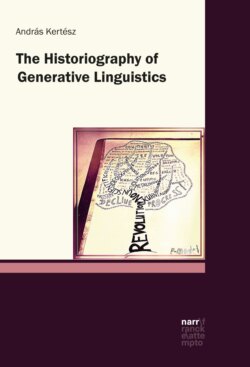Читать книгу The Historiography of Generative Linguistics - András Kertész - Страница 35
На сайте Литреса книга снята с продажи.
2.5.2 No revolution 2.5.2.1 Spurious science
ОглавлениеAccording to others, however (SearleSearle, John R. 2002a; PostalPostal, Paul M. 2003; PullumPullum, Geoffrey K. 1996; SeurenSeuren, Pieter A.M. 2004 etc.), minimalismminimalism is neither revolutionaryrevolutionary nor a progressive research programresearchprogram. This perspective will be represented by the example of Seuren (2004). The thesis is the following:
| (T21) | The Minimalist ProgramMinimalist Program is spurious science.sciencespurious |
According to SeurenSeuren, Pieter A.M. (2004: 3), the Minimalist ProgramMinimalist Program represents not the glorification but rather the destruction of the development that ChomskyChomsky, Noam started with his early work. What is more,1
[…] ChomskyChomsky, Noam’s book The Minimalist ProgramMinimalist Program is a sad example of spurious sciencesciencespurious, as it fails to satisfy basic scientificscientific criteria, such as respect for datadata, unambiguous formulations, falsifiability, and also, on a different level, simple good manners (SeurenSeuren, Pieter A.M., 2004: 4; emphasis added).
SeurenSeuren, Pieter A.M. (2004: 8–10) bases his judgment on methodological criteria taken from the philosophy of sciencephilosophy of science. Referring to PopperPopper, Karl R. (1959), he maintains that according to the analytic philosophy of science there are generally accepted criteria of scientificscientific rationality which are rooted in common sense knowledge and are timeless. However, he also notes that this picture of science has been questioned by recent post-KuhnianKuhnian approaches which tend to relativism and which highlight the role of socialsocial factors in scientific inquiry. The latter maintain that the content of scientific knowledge is determined by social factors that change over time and that are shaped by the structure of social groups and social interests. Seuren chooses the middle course between these extremes. He does not deny that social factors can influence scientific inquiry, but at the same time, in accordance with the principles of the analytical philosophy of science, he also assumes that scientific values have universal features. He holds that
[…] work that presents itself as in any way scientificscientific or academic should satisfy certain judiciously applied elementary criteria of common rationality: clarity of expression; faithfulness to the relevant facts that are, or can be made, available, acceptance of whatever can be concluded on the basis of these facts; and a mandatory preference for the ›best theorytheory‹ – that is, for the theory that explains more facts with less machinery than rival theories on the market (SeurenSeuren, Pieter A.M. 2004: 10).
In SeurenSeuren, Pieter A.M.’s view, the Minimalist ProgramMinimalist Program fails to meet these criteria, and the final verdict is:2
[…] In the end, one is left with a story that is partly an incoherent fantasy […] and partly a repetition of old principles and methods (ibid 14).
The MP does not emerge as a serious theorytheory of grammargrammar or languagelanguage. Based as it is on flimsy general premises, an unsound methodologymethodology, unclear formulations and ideas, and a fatal scarcity of datadata. Every single element in the MP, to the extent that it was not taken over from elsewhere, has turned out to be badly researched, vaguely presented, or unsufficiently tested (ibid. 228).
The solution offered for (P) is:3
| (SP21) | The basic term of the historiographyhistoriography of generative linguistics is ›spurious science‹sciencespurious with respect to the Minimalist Program,Minimalist Program its central hypothesis is (T21) and its framework is the generally accepted criteria of scientificscientific rationality in the analytic philosophy of science.philosophy of science |
